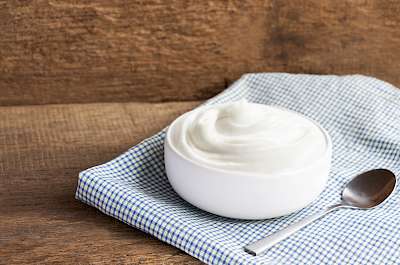Greek Yoghurt: Calories and Nutrition Analyse
How many calories in Greek yoghurt?

Nutrition Facts
Greek YoghurtServing size:
tablespoon of Greek yoghurt (20 g) change
5g10g15g20g30g40g50g60g80g100g120g140g160g180g200g220g250g300g350g400g450g500g600g700g800g900g1000g
1oz2oz3oz4oz5oz6oz7oz8oz10oz12oz15oz20oz25oz30oz35oz40oz50oz
Amount Per Serving:
100g of Greek yoghurt contain about 59 calories (kcal).
Calories per:
ounce
| tablespoon
| teaspoon
| glass
| cup
| half cup
To show you what does it mean, a tablespoon of Greek yoghurt (20 g) contain about 12 calories.
This is about 1% of the daily caloric intake for an average adult with medium weight and activity level (assuming a 2000 kcal daily intake).
Scroll down for details and nutrition tables.
To visualize how much 12 kcal actually is, keep in mind that the calorie content of tablespoon of Greek yoghurt is similar to that of, for example:
- 0.5 cube of sugar
Take a quick look at the tables below for detailed information about Greek yoghurt nutrition.
100g of Greek Yoghurt
Nutrition
- Calories59
- Carbs Total3.6 g
- Dietary fiber0 g
- Fat0.39 g
- Protein10.19 g
- Water85.1 g
Vitamins
- Vit A4 IU
- Vit B1 (Thiamine)0.023 mg
- Vit B2 (riboflavin)0.278 mg
- Vit B3 (Niacin)0.208 mg
- Vit B60.063 mg
- Vit B9 (Folic acid)0.007 mcg
- Vit E0.01 mg
Minerals
- Potassium141 mg
- Phosphorus1 mg
- Magnessium11 mg
- Calcium110 mg
- Sodium36 mg
- Iron0.07 mg
- Zink1 mg
Nutritional Secrets of Greek Yoghurt
Greek yoghurt has long been celebrated as a superfood, and for good reason. Its creamy texture and tangy taste make it a favorite among health enthusiasts and culinary experts alike. But beyond its delicious flavor, Greek yoghurt packs a nutritional punch that can play a pivotal role in a balanced diet.
Calories in Greek Yoghurt
One of the most appealing aspects of Greek yoghurt is its calorie content. With just 59 calories per 100 grams, it's a low-calorie option that doesn't skimp on flavor or texture. This makes Greek yoghurt an excellent choice for those monitoring their calorie intake or looking for a light yet satisfying snack.
Protein in Greek Yoghurt
When it comes to protein, Greek yoghurt truly shines. Boasting an impressive 10.19 grams of protein per 100 grams, it's a fantastic source of this essential macronutrient. Protein is crucial for muscle repair, growth, and overall body function, making Greek yoghurt a go-to option for athletes, fitness enthusiasts, and anyone looking to boost their protein intake.
Fat in Greek Yoghurt
Despite its creamy texture, Greek yoghurt is surprisingly low in fat. With only 0.39 grams of fat per 100 grams, it's a low-fat option that still delivers on taste and satisfaction. This low fat content is particularly beneficial for those looking to reduce their saturated fat intake without sacrificing the richness and mouthfeel of their favorite foods.
Carbs in Greek Yoghurt
Carbohydrates are another key component of Greek yoghurt's nutritional profile. With 3.6 grams of carbs per 100 grams, of which sugars account for 3.24 grams, it's a low-carb food that can easily fit into a variety of dietary plans. The relatively low sugar content also makes it a smarter choice for those watching their sugar intake.
Nutritional Benefits Beyond the Basics
Greek yoghurt doesn't stop at protein, fat, and carbs. It's also rich in essential vitamins and minerals, including calcium, potassium, and magnesium. For instance, with 110 mg of calcium per 100 grams, it's a great way to support bone health. Additionally, the presence of probiotics in Greek yoghurt supports digestive health, making it a multifaceted addition to a healthy diet.
In conclusion, Greek yoghurt is more than just a tasty treat; it's a nutritional powerhouse that offers a wide range of health benefits. Whether you're looking to increase your protein intake, reduce your calorie consumption, or simply enjoy a delicious and nutritious snack, Greek yoghurt is an excellent choice. Its balance of Greek yoghurt calories, protein, fat, and carbs, along with its rich array of vitamins and minerals, makes it a versatile and beneficial part of any diet.
How many calories are there in 1, 2, 3, or 5 servings of Greek yoghurt?
- Tablespoon of Greek yoghurt (20g)12 kcal
- Teaspoon of Greek yoghurt (12g)7 kcal
- Glass full of Greek yoghurt (240g)142 kcal
- Cup of Greek yoghurt (285g)168 kcal
- Half cup of Greek yoghurt (142.5g)84 kcal
- Ounce (oz) of Greek yoghurt17 kcal
- Half of medium size servings of Greek yoghurt6 kcal
- Small size serving of Greek yoghurt (16g)9.6 kcal
- Big size Greek yoghurt (26g)15.6 kcal
- Two medium size servings of Greek yoghurt24 kcal
- Three medium size servings of Greek yoghurt36 kcal
- Four medium size servings of Greek yoghurt48 kcal
- Five medium size servings of Greek yoghurt60 kcal
Compare Greek yoghurt:
Greek yoghurt vs egg, Greek yoghurt vs mascarpone, Greek yoghurt vs cottage cheese, Greek yoghurt vs kefir, Greek yoghurt vs sour cream, Greek yoghurt vs plain yogurt, Greek yoghurt vs whole milk, Greek yoghurt vs buttermilk, Greek yoghurt vs goat cheese, Greek yoghurt vs ricotta cheese, Greek yoghurt vs cream cheese, Greek yoghurt vs coconut milk, see all compares of Greek yoghurt.

Similar calories number have:
See also:
Read this:
- How many calories does teriyaki sauce have?
- Calories in a half of Alfredo sauce
- Calories in whole Alfredo sauce
- Calories for one, two or more Alfredo sauce
- How many carbs (carbohydrates) in frappuccino?
- How much fat in apple salad?
- How much protein in horchata?
- What is weight of Fettuccine Alfredo veal?
- Mojito calories per ounce (oz)
- Eel sushi roll calories per serving size



Add comment